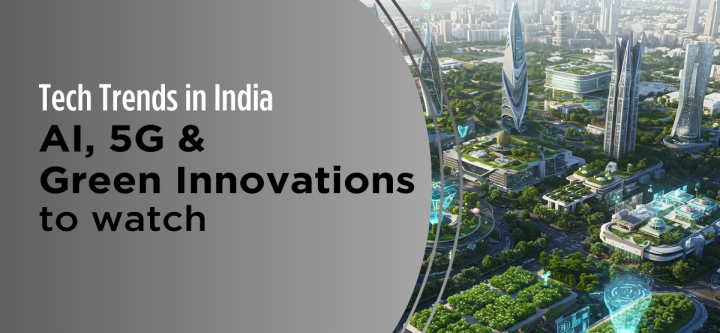India is on the brink of a technological revolution, and the next decade promises to reshape industries, create new opportunities and push boundaries like never before. With rapid advancements in Artificial Intelligence (AI) Green Technology and the nationwide roll-out of 5G; India is positioning itself as a global leader in innovation. These technologies are not just tools but catalysts for widespread change, influencing everything from how businesses operate to how people connect and live their daily lives.
For instance, AI is already being adopted across sectors like healthcare, agriculture and e-commerce, improving efficiency and decision-making. Meanwhile, the rise of Green Technology is pushing India toward a more sustainable future by emphasizing renewable energy, electric mobility and eco-friendly industrial practices. The roll-out of 5G promises to revolutionize communication, enabling faster internet speeds, seamless remote work and the growth of smart cities.
But what does this mean for a country as diverse as India? How will these transformative technologies mould the nation’s future and what challenges might arise along the way?
This blog dives deep into these cutting-edge fields, offering examples of real-world applications, data-driven insights and actionable strategies for businesses, policymakers and tech enthusiasts. As India embraces this wave of innovation, understanding its implications will be crucial to harnessing its full potential and ensuring inclusive growth for all.
AI in India: The Intelligent Leap
Harnessing AI for Productivity Boom
Artificial Intelligence (AI) is no longer a futuristic concept; it’s already transforming every industry. According to a 2024 NASSCOM report, the AI market in India is expected to grow by $500 billion by 2025, contributing nearly 10% of the country’s GDP.
Applications of AI in India are endless:
Healthcare:
Predictive analytics for diagnosing diseases earlier is becoming mainstream, transforming the way healthcare is delivered. For example, cardiac health monitoring apps powered by AI are already available in India, allowing users to track heart health in real time and receive early warnings about potential issues. These tools not only save lives but also reduce the strain on medical professionals by enabling preventive care.
Agriculture:
AI-driven drones analyze crop health, soil conditions, and weather patterns to offer actionable insights, helping farmers improve yields and make smarter decisions. By 2025, AI in farming is expected to reduce the need for water and fertilizers by 25–50%, making agriculture more sustainable and cost-effective while addressing global food security challenges.
Finance & Risk Management:
Banks like HDFC and Axis Bank use AI-based chatbots for 24/7 customer support, answering queries quickly and improving user experience. AI also plays a crucial role in fraud detection by analyzing transactions in real time and flagging suspicious activities, helping financial institutions minimize risks and protect their customers.
AI Startups are Thriving
India has emerged as a hub for AI innovation, boasting over 7,000 AI startups that are driving transformative changes across industries. Especially new age startups are leading the way, focusing on groundbreaking advancements in AI vision and redefining how technology interacts with the world. These startups are not just isolated success stories but are part of a larger movement that’s embedding AI across sectors. Particularly noteworthy is the infusion of AI into small and medium enterprises (SMEs), proving that AI isn’t reserved for multinationals. By automating processes and improving operational efficiency, AI is democratizing access to advanced technology, enabling businesses of all sizes to compete on a global scale.
Challenges and Opportunities
Despite the rapid growth of AI adoption, challenges remain. Issues such as data privacy, ethical implementation and a shortage of skilled talent are significant hurdles that need to be addressed. Moreover, the complexity of adopting AI solutions can be daunting for businesses unfamiliar with the technology. However, India is actively tackling these challenges with initiatives like the Skill India Initiative, which aims to train over 1.5 million individuals in AI and data science by 2025. This program is poised to bridge the talent gap, equipping the workforce with the skills needed to meet the demands of a rapidly evolving industry. With these efforts, India is not only fostering innovation but also creating a robust ecosystem that supports sustainable growth in the AI landscape.
Green Tech Revolution in India
Sustainability Meets Innovation
With climate change looming large, green technologies are India’s path forward. According to the IRENA report (2024), India stands to generate 1.2 million green jobs by 2025 through its clean energy and eco-technology initiatives.
Some game-changing areas of green tech in India include:
Renewable Energy Expansion
By December 2024, India surpassed an impressive 200 GW of renewable energy capacity, taking a significant step toward its ambitious goal of achieving 500 GW by 2030. This growth is primarily driven by large-scale wind and solar farms, with Gujarat and Rajasthan emerging as the frontrunners due to their favorable climate and vast open spaces. These states have become hubs for green energy projects, attracting both domestic and international investments to boost capacity and innovation in renewable technologies.
Electric Vehicles (EVs)
India’s EV revolution is being powered by startups like Ather Energy and industry leaders like Tata Motors, who are driving the electrification of transportation. From scooters to passenger cars, the EV market is booming, with reports for 2025 showing a staggering 150% year-over-year growth in EV adoption. However, this rapid growth faces challenges such as the need for extensive charging infrastructure and government-supported policies to make EVs accessible and affordable for all. Despite these hurdles, the EV sector is paving the way for a cleaner, more sustainable future in transportation.
Waste-to-Energy Initiatives
Innovative waste-to-energy initiatives are transforming how cities manage their growing waste problem. Cities like Pune and Indore have adopted advanced waste-to-energy plants, turning municipal waste into electricity that powers thousands of households and businesses. These projects not only reduce landfill waste but also create a sustainable energy source, showcasing a scalable solution for urban areas grappling with waste management challenges.
Green Tech Investments
By 2024, India had received over $100 billion in green tech investments. Sustainable fintech firms like Evolute are also leveraging this boom, delivering innovative, energy-efficient solutions to businesses while lowering operational costs.
The 5G Future of India
Connectivity Will Redefine Growth
India completed its nationwide rollout of 5G in early 2024, with telecom giants Jio and Airtel leading the charge. According to Statista, India’s 5G subscriber base is expected to exceed 500 million by 2025, facilitating groundbreaking innovations across industries like healthcare, education and retail.
Remote Healthcare
With the rollout of reliable 5G connectivity, telemedicine is poised to connect over 60 million rural Indians to urban hospitals by 2025. This will bridge the gap between remote areas and top-tier medical facilities, enabling patients in underserved regions to access high-quality healthcare services, including specialist consultations and advanced diagnostics, like never before. This transformation has the potential to save countless lives by ensuring timely medical intervention.
Smart Cities
India’s smart city projects are getting a significant boost from IoT technology and high-speed 5G networks. These advancements are enhancing critical urban infrastructure, such as traffic control systems, real-time surveillance and waste management solutions, making cities like Bengaluru and Pune more efficient and sustainable. With data-driven insights, these cities are better equipped to address urban challenges, improve the quality of life for residents and pave the way for environmentally friendly solutions.
E-Learning Transformation
5G-powered technologies like augmented reality (AR) and virtual reality (VR) are reshaping education across India. These innovations bring immersive, hands-on learning experiences to classrooms, making lessons more engaging and interactive for students. From virtual science labs to historical reenactments, 5G is enabling schools and colleges nationwide to offer cutting-edge educational tools that inspire creativity and enhance understanding. This transformation is set to bridge gaps in access to quality education, particularly in rural and remote areas.
Economic Impact of 5G
According to Goldman Sachs, India’s 5G network economy is predicted to contribute $450 billion to the GDP by 2035, enabling industries to become smarter and more competitive globally.
Transforming India, One Digit at a Time
Every major technology creates ripple effects—AI, 5G and green tech are no different. Together, they are reshaping India’s economy, creating jobs, improving sustainability and placing the country at the forefront of global innovation.
Evolute Group, India’s one of the leading fintech and digital solutions providers, stands firmly committed to this mission. By developing eco-friendly technology and cutting-edge solutions, Evolute is empowering both startups and enterprises to thrive in this exciting era.
What’s Next for India?
Here are five key takeaways shaping India’s tech-driven future:
- AI Applications: By 2025, AI will add $500 billion to India’s GDP, creating smarter, faster, and innovative businesses.
- Green Jobs: Over 1.2 million green jobs will arise, thanks to renewable energy initiatives.
- 5G Revolution: With 500 million Indian 5G users, connectivity will drive sectors like healthcare, education, and smart cities.
- Startups Matter: AI and sustainability-focused startups represent the backbone of India’s next wave of innovation.
- Economic Growth: Technology is set to contribute over 10% of GDP growth in areas spanning fintech, manufacturing with industry 4.0, and logistics.
By staying on top of these trends, businesses, policymakers and entrepreneurs can make informed decisions that align with India’s tech-driven growth. If you’re ready to transform your operations, consider connecting with leading innovators like Evolute to unlock new possibilities.
Start shaping the future now—India’s tech revolution waits for no one.





